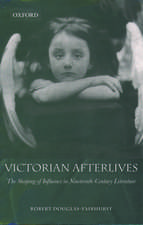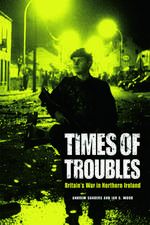Dickens and the Spirit of the Age
Autor Andrew Sandersen Limba Engleză Hardback – 30 sep 1999
Preț: 858.50 lei
Preț vechi: 1306.64 lei
-34% Nou
Puncte Express: 1288
Preț estimativ în valută:
164.27€ • 171.51$ • 135.96£
164.27€ • 171.51$ • 135.96£
Carte tipărită la comandă
Livrare economică 25-31 martie
Preluare comenzi: 021 569.72.76
Specificații
ISBN-13: 9780198183549
ISBN-10: 0198183542
Pagini: 206
Dimensiuni: 144 x 224 x 17 mm
Greutate: 0.36 kg
Editura: OUP OXFORD
Colecția OUP Oxford
Locul publicării:Oxford, United Kingdom
ISBN-10: 0198183542
Pagini: 206
Dimensiuni: 144 x 224 x 17 mm
Greutate: 0.36 kg
Editura: OUP OXFORD
Colecția OUP Oxford
Locul publicării:Oxford, United Kingdom
Recenzii
The discussion of Paris and London is among the strongest in the book, and Sanders elegantly reveals some of the ways in which these cities, with their various histories and their different cityscapes, so strongly attracted the great Victorian writer. ... Sanders's book convincingly illustrates Dickens's qualifications for representing and engaging with the novelty of his own age. ...By so adeptly presenting his case, Sanders makes compelling claims for Dickens's continuing relevance and importance to our own age.
most fasinating for its local discussion and its detail. The contexts in which Sanders situates the victorian writer are often revealing. ...The discussion of Dicken's petty-bourgeois attitudes against the background of the complex and changing perceptions of class in Victorian Britain is also among the most stimulating in the book. One of the things Sanders does very admirably is to normalize Dickens. That is, by conscientiously historicizing him, he shows a Dickens who is more representative than odd. ...The discussion of Dickens's relationship to eighteenth-century novelists such as Fielding and Smollett is also perceptive, and Sanders makes intelligent suggestions about what impact they had on Dickens's fiction.
Sanders is astute in placing Dickens in relation to literary tradition.
Dickens and the Spirit of the Age is historical criticism at its best. Sanders sails skilfully between the Scylla of dry-as-dust pedantry and the Charybdis of jargon-laden theorizing. Whereas all too many works of criticism over the past generation which purport to establish the relevance of Dickens to the modern reader lack the necessary ballast of sound historical awareness, Sanders brings depth and range of familiarity with nineteenth-century literature and culture which make this book constantly enlightening.
most fascinating for its local discussion and its detail.
The discussion of Dicken's petty-bourgeois attitudes agains the background of the complex and changing perceptions of class in Victorian Britain is also among the most stimulating in the book./ One of the things Sanders does very admirably is to normalize Dickens.
Sander's book convincingly illustrates Dickens's qualifications for representing and engaging with the novelty of his own age.
most fasinating for its local discussion and its detail. The contexts in which Sanders situates the victorian writer are often revealing. ...The discussion of Dicken's petty-bourgeois attitudes against the background of the complex and changing perceptions of class in Victorian Britain is also among the most stimulating in the book. One of the things Sanders does very admirably is to normalize Dickens. That is, by conscientiously historicizing him, he shows a Dickens who is more representative than odd. ...The discussion of Dickens's relationship to eighteenth-century novelists such as Fielding and Smollett is also perceptive, and Sanders makes intelligent suggestions about what impact they had on Dickens's fiction.
Sanders is astute in placing Dickens in relation to literary tradition.
Dickens and the Spirit of the Age is historical criticism at its best. Sanders sails skilfully between the Scylla of dry-as-dust pedantry and the Charybdis of jargon-laden theorizing. Whereas all too many works of criticism over the past generation which purport to establish the relevance of Dickens to the modern reader lack the necessary ballast of sound historical awareness, Sanders brings depth and range of familiarity with nineteenth-century literature and culture which make this book constantly enlightening.
most fascinating for its local discussion and its detail.
The discussion of Dicken's petty-bourgeois attitudes agains the background of the complex and changing perceptions of class in Victorian Britain is also among the most stimulating in the book./ One of the things Sanders does very admirably is to normalize Dickens.
Sander's book convincingly illustrates Dickens's qualifications for representing and engaging with the novelty of his own age.











